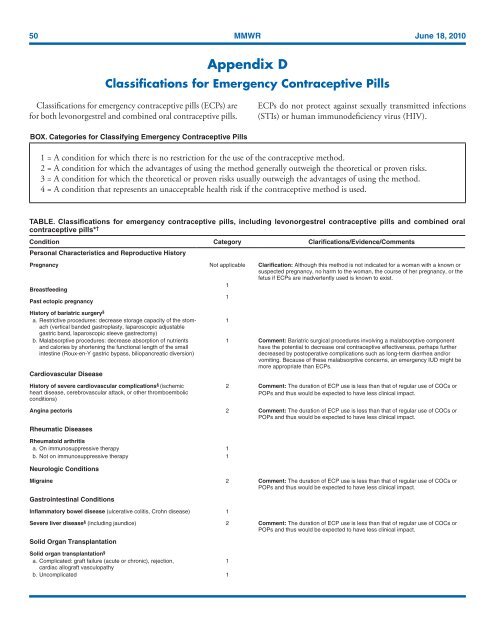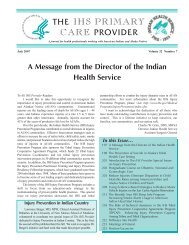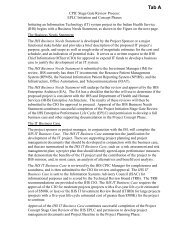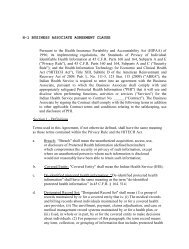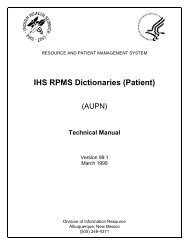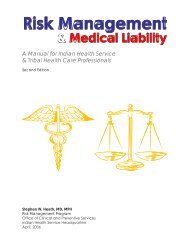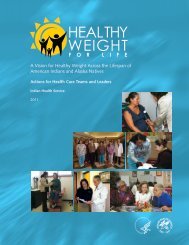CDC Article-US Medical Eligibility Criteria for Contraceptive Use, 2010
CDC Article-US Medical Eligibility Criteria for Contraceptive Use, 2010
CDC Article-US Medical Eligibility Criteria for Contraceptive Use, 2010
You also want an ePaper? Increase the reach of your titles
YUMPU automatically turns print PDFs into web optimized ePapers that Google loves.
50 MMWR June 18, <strong>2010</strong><br />
Appendix D<br />
Classifications <strong>for</strong> Emergency <strong>Contraceptive</strong> Pills<br />
Classifications <strong>for</strong> emergency contraceptive pills (ECPs) are<br />
<strong>for</strong> both levonorgestrel and combined oral contraceptive pills.<br />
ECPs do not protect against sexually transmitted infections<br />
(STIs) or human immunodeficiency virus (HIV).<br />
BOX. Categories <strong>for</strong> Classifying Emergency <strong>Contraceptive</strong> Pills<br />
1 = A condition <strong>for</strong> which there is no restriction <strong>for</strong> the use of the contraceptive method.<br />
2 = A condition <strong>for</strong> which the advantages of using the method generally outweigh the theoretical or proven risks.<br />
3 = A condition <strong>for</strong> which the theoretical or proven risks usually outweigh the advantages of using the method.<br />
4 = A condition that represents an unacceptable health risk if the contraceptive method is used.<br />
TABLE. Classifications <strong>for</strong> emergency contraceptive pills, including levonorgestrel contraceptive pills and combined oral<br />
contraceptive pills* †<br />
Condition Category Clarifications/Evidence/Comments<br />
Personal Characteristics and Reproductive History<br />
Pregnancy Not applicable Clarification: Although this method is not indicated <strong>for</strong> a woman with a known or<br />
suspected pregnancy, no harm to the woman, the course of her pregnancy, or the<br />
fetus if ECPs are inadvertently used is known to exist.<br />
Breastfeeding<br />
1<br />
Past ectopic pregnancy<br />
1<br />
History of bariatric surgery §<br />
a. Restrictive procedures: decrease storage capacity of the stomach<br />
(vertical banded gastroplasty, laparoscopic adjustable<br />
gastric band, laparoscopic sleeve gastrectomy)<br />
b. Malabsorptive procedures: decrease absorption of nutrients<br />
and calories by shortening the functional length of the small<br />
intestine (Roux-en-Y gastric bypass, biliopancreatic diversion)<br />
Cardiovascular Disease<br />
History of severe cardiovascular complications § (ischemic<br />
heart disease, cerebrovascular attack, or other thromboembolic<br />
conditions)<br />
1<br />
1 Comment: Bariatric surgical procedures involving a malabsorptive component<br />
have the potential to decrease oral contraceptive effectiveness, perhaps further<br />
decreased by postoperative complications such as long-term diarrhea and/or<br />
vomiting. Because of these malabsorptive concerns, an emergency IUD might be<br />
more appropriate than ECPs.<br />
2 Comment: The duration of ECP use is less than that of regular use of COCs or<br />
POPs and thus would be expected to have less clinical impact.<br />
Angina pectoris 2 Comment: The duration of ECP use is less than that of regular use of COCs or<br />
POPs and thus would be expected to have less clinical impact.<br />
Rheumatic Diseases<br />
Rheumatoid arthritis<br />
a. On immunosuppressive therapy 1<br />
b. Not on immunosuppressive therapy 1<br />
Neurologic Conditions<br />
Migraine 2 Comment: The duration of ECP use is less than that of regular use of COCs or<br />
POPs and thus would be expected to have less clinical impact.<br />
Gastrointestinal Conditions<br />
Inflammatory bowel disease (ulcerative colitis, Crohn disease) 1<br />
Severe liver disease § (including jaundice) 2 Comment: The duration of ECP use is less than that of regular use of COCs or<br />
POPs and thus would be expected to have less clinical impact.<br />
Solid Organ Transplantation<br />
Solid organ transplantation §<br />
a. Complicated: graft failure (acute or chronic), rejection,<br />
1<br />
cardiac allograft vasculopathy<br />
b. Uncomplicated 1


